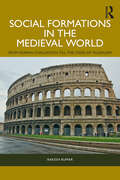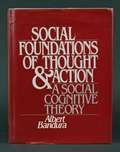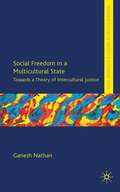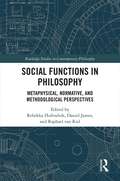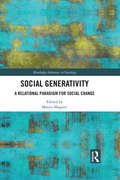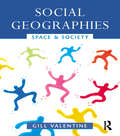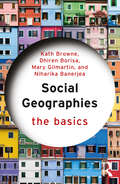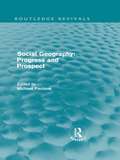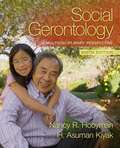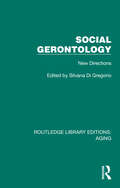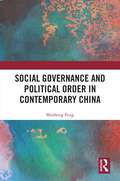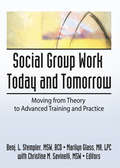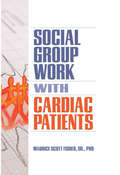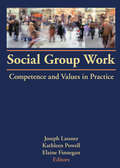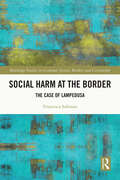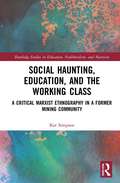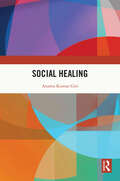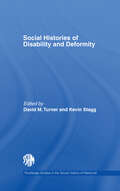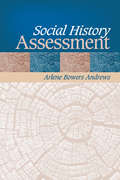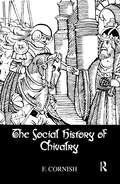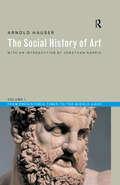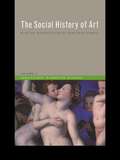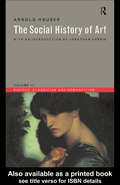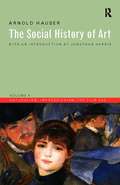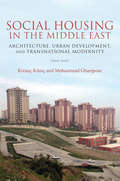- Table View
- List View
Social Formations in the Medieval World: From Roman Civilization till the Crisis of Feudalism
by Rakesh KumarThis book encapsulates a period of history of human progress by highlighting crucial social, economic, and cultural dynamics. It presents recent historiography and new analytical tools used to analyse multi-dimensional themes involved in social formation. This is a reader-friendly book with simple and lucid language and fulfils the pressing needs of students studying the paper ‘Social Formations and Cultural Patterns of Ancient and Medieval World’ at various universities across the world. The summary, keywords, and representative questions at the end of each chapter would assist in revision and better understanding of the issues dealt therein. A detailed chapter-end reference would enable and motivate the readers to engage in further studies for better understanding of the themes.This book will be of interest to students, researchers, and academics in the area of history—ancient and medieval world history in particular and anthropology. It will also be an interesting read for general readers interested in knowing about the ancient and medieval world.
Social Foundations Of Thought And Action: A Social Cognitive Theory (Prentice-hall Series In Social Learning Theory)
by Albert BanduraPresents a comprehensive theory of human motivation and action from a social-cognitive perspective. This insightful text addresses the prominent roles played by cognitive, vicarious, self-regulatory, and self-reflective processes in psychosocial functioning; emphasizes reciprocal causation through the interplay of cognitive, behavioral, and environmental factors; and systematically applies the basic principles of this theory to personal and social change.
Social Freedom in a Multicultural State
by Ganesh NathanThe politics of multiculturalism faces challenges in Western democratic states. Arguing that this setback is based on the notion of culture as separate and distinct, this book explores how to face current challenges to multiculturalism without reifying culture, group and identity.
Social Functions in Philosophy: Metaphysical, Normative, and Methodological Perspectives (Routledge Studies in Contemporary Philosophy)
by Daniel James Raphael Van Riel Rebekka HufendiekSocial functions and functional explanations play a prominent role not only in our everyday reasoning but also in classical as well as contemporary social theory and empirical social research. This volume explores metaphysical, normative, and methodological perspectives on social functions and functional explanations in the social sciences. It aims to push the philosophical debate on social functions forward along new investigative lines by including up-to-date discussions of the metaphysics of social functions, questions concerning the nature of functional explanations within the social domain, and various applications of functionalist theorising. As such, this is one of the first collections to exclusively address a variety of philosophical questions concerning the nature and relevance of social functions.
Social Generativity: An Introduction (Routledge Advances in Sociology)
by Mauro MagattiThe 2008 economic crisis called into question the sustainability of the individualistic consumer society. However, for better or for worse, this long-term crisis represents an opportunity for the creation of a new model of growth to reform capitalism, structurally as well as culturally. As a contribution to this debate, Social Generativity offers a much-needed and original conceptual synthesis, within a unique anthropological focus on the forms of selfhood sustained by the historical and economic conditions of the present day. Encompassing four years of interdisciplinary empirical research based primarily on a sample of social groups, organizations and firms in Italy, this volume redefines the notion of "Social Generativity" from its pyschological origin (as formulated by Erik Erikson) to that of a social action that can be implemented during daily life and in different spheres of existence. A critical analysis of contemporary capitalism, this volume will appeal to postgraduate students and policy makers interested in fields such as Organisational Studies, Anthropological Theory, Social Change, Economic Sociology, Public Affairs and Business Ethics.
Social Geographies: Space and Society
by Gill ValentineMost social geography undergraduate textbooks are structured around different social categories, splintering the discussion of gender, class, race and increasingly now sexuality and disability, into separate chapters. This has the effect, firstly, of making social relations rather than space (the raison d'etre of human geography) the focus of undergraduate books; secondly of ignoring the way that social relations are negotiated and contested in different space. Rather than reproducing this conventional social geography format the aim of this proposed text is to make space the focus of analysis. In doing so the intention is to make complex theoretical debates about space more accessible to students and encourage them to look at their own environments in new ways.
Social Geographies: The Basics (The Basics)
by Mary Gilmartin Kath Browne Niharika Banerjea Dhiren BorisaSocial Geographies: The Basics introduces what social geography is, and what it might be. It outlines the key contours of social geographies, and also disrupts some of the conventions of the discipline in both its content and structure.This book approaches social geographies by beginning with the resistances, contestations and ‘solutions’ that communities use to challenge exclusions in place and space in order to create equitable societies. It then addresses the inequalities, precarities, and ‘problems’ that prompt these interventions. This allows the book to emphasise the importance of activism in the here and now, and to show how activism often makes issues visible and contested in ways that are then theorised by academics. Social Geographies starts with solidarities, communities, and networks before moving to examine difference, precarity, and mobilities. Each chapter offers key case studies that centre resistance, contestations of inequitable power, and local knowledges that can often be seen as ‘solutions’ to national and transnational issues, creating a decolonial understanding of ‘social geography from below’ within and across national contexts.This book is essential reading for undergraduate students and readers new to the area, as well as anyone studying introductory geography, social, cultural and critical geography, ‘the spatial turn’ and issues of spatialities, and key issues like precarity, power, difference, equality, and mobilities.
Social Geography: Progress and Prospect (Routledge Revivals)
by Michael PacioneThe examination of social questions is a relatively new development in goegraphy, but social geography has now blossomed into a fully fledged sub-discipline which has in fact influenced significantly all other areas of geography. This book, first published in 1987, presents an overview of recent developments in all the major branches of social geography. As such it provides a valuable introduction to te subject, a review of the latest state of the art and a pointer to future research directions.
Social Gerontology (9th Edition)
by Nancy R. Hooyman H. Asuman KiyakThe primary focus of this book is on social gerontology and to present the diversities of the aging experience, the interaction between biological, psychological, social and cultural forces on aging, and the heterogeneity of the older population in a multidisciplinary manner.
Social Gerontology: New Directions (Routledge Library Editions: Aging)
by Silvana Di GregorioOriginally published in 1987, Social Gerontology presents papers from the British Society of Gerontology annual conference held at the University of Glasgow in September 1986. It shows much of the most innovative research and thinking in social gerontology and will interest a wide range of academics and professionals in the social and health sciences and services, interested in gerontology and the welfare of elderly people.
Social Governance and Political Order in Contemporary China
by Shizheng FengFocusing on the conflict and coordination between social development and political order in social governance, this book investigates the causes, evolution, and manifestations of such tensions in contemporary China, combining both qualitative and quantitative analysis. It has always been a complicated issue for social governance in China to maintain a balanced and benign interaction between social development and political order: Strong leadership from the state can foster robust social development, which can itself pose challenges to the existing political order. To approach this paradox, this book first discusses the entanglement of law and politics in China’s social governance, embodied by state legitimacy of the state and its governance. It then examines institutional changes through analyzing the relationship between market mechanisms and planned systems, as well as the petitioning system, a unique political setup in China. By examining arbitrariness in the practice of Mao Zedong’s theory on two types of contradictions, the author uncovers the characteristics and political basis of China’s approach to resolving social conflict. This title is essential reading for scholars and students studying sociology and political science, especially those interested in social governance in China and contemporary Chinese politics. Shizheng Feng is Professor and Dean of the School of Sociology and Population Studies at Renmin University of China. His research areas include political sociology, historical sociology, social governance and state-making, and political order in China’s social transformation.
Social Group Work Today and Tomorrow: Moving From Theory to Advanced Training and Practice
by Benjamin L Stempler Marilyn GlassA comprehensive introduction to policy and planning approaches, methods, models, ways of thinking, and techniques, Social Group Work Today and Tomorrow is presented in a reader-friendly fashion for persons with no prior formal training in this area. The book teaches social workers, group counselors, educators and students, and practitioners how to apply group work theory to practice in an increasingly time-limited and managed-care-oriented society. Social Group Work Today and Tomorrow converts sophisticated policy and planning concepts and techniques into a form which even non-experts can understand, relate to, and apply in their own practice.Chapters reflect the work of the “giants” of social group work and also recognize contributions being made by the current generation of educators and practitioners. The contributors’chapters span many topical areas, among them: an interactionist theoretical perspective on creative uses of groups a moving look at the second decade of the AIDS epidemic creative use of dance with group work creative group work with ill elderly practice groups for students to prepare them for professional work with groups women’s issues and empowerment creative ways to use groups to educate among homosexual men on safe sexual practices the use of one-session groups to respond to job-related traumaChapters strike a strong note for social group work’s base in an interactionist perspective and for the overall efficacy and uniqueness of the method. Throughout the text, readers learn and explore group types and formats ranging from verbal to activity; from one session to beyond a year; from education to support; and from developmental to rehabilitation. Ethics, self-esteem, identity, and empowerment themes are prominent throughout this work’s pages.Social Group Work Today and Tomorrow is an accurate reflection of the quality, creativity, and energy that made up the Fourteenth Annual Symposium on Social Work With Groups. The creativity and innovativeness reflected in these pages offers new ideas and direction to all of social workers, counselors, and educators who choose the experience of working with groups.
Social Group Work with Cardiac Patients (Haworth Social Work in Health Care)
by Maurice Scott FisherDevelop a comprehensive understanding of cardiac disease process Cardiovascular problems are on the rise in America. Care providers need to understand the overall clinical and statistical significance these life-changing events have to patients and families alike. Social Group Work with Cardiac Patients is a pragmatic guide that helps social workers and other psychosocial professionals develop and apply cardiac group work in a proactive and directed manner. This valuable text explores social group work with patients immediately recovering from a cardiac event-heart attack or failure, transplants, and implantable cardiac devices-as well the secondary effects of such events. Social Group Work with Cardiac Patients helps social work and healthcare professionals develop a comprehensive understanding of the psychosocial aspect of cardiac care. In addition to examining the correlation between cardiac disease and depression and anxiety, looking at the emotional aspects of heart disease, and providing an overview of social work group care, this unique text details the four core social groups-cognitive-behavioral, psychoeducational, skill development, and interpersonal. Both fundamental and state-of-the-art, this comprehensive approach serves to enhance practice skills for immediate and constructive implementation. Important topics discussed in Social Group Work with Cardiac Patients also include: understanding adherence to cardiac health and psychosocial variables suggestions for using basic social groups and their development adherence issues associated with care stress management management of anger among patients holistic affects of cardiac disease on patients and families compliance, follow-up, and follow through substance abuse human sexuality differences between support groups and social group work models group leadership and co-leadership skills and many more! Social Group Work with Cardiac Patients is an asset as a pragmatic, relevant guide for development and actuation of both general social groups and specialty group treatment. An accessible and practical stand-alone text, Social Group Work with Cardiac Patients is ideal for mental health and substance abuse social workers, counselors, cardiac nurse specialists, cardiac treatment staff, and students of social work.
Social Group Work: Competence and Values in Practice
by Joseph LassnerHere is an exciting and stimulating book featuring expert evaluations and descriptions of current social work group practice with an overall focus on competence and values. The contributors give detailed information on group work theory, group structure, gender and race issues in group work, group work in health care settings, and the use of groups for coping with family issues that will be invaluable for all professionals in their daily practice. This thorough and inspiring overview of the state of the art in social group work today contains the published proceedings of a recent Symposium for the Advancement of Social Work With Groups.
Social Harm at the Border: The Case of Lampedusa (Routledge Studies in Criminal Justice, Borders and Citizenship)
by Francesca SolimanThis book offers a zemiological approach for understanding border control practices, state power, and their social impact. Drawing on an ethnographic study on the borderisation of the Mediterranean island of Lampedusa, it explores border harms from the perspective of the non-migrant community. Social Harm at the Border examines a range of social harms associated with border control, and draws on themes of security, racialised humanitarianism, economic harms, environment, and culture. It explores the ways in which borderisation exercises control over both migrants and non-migrants, ensuring that border communities remain subordinated to the power of institutional actors, and it offers a novel framework with which to illuminate and explain border harms and their generative mechanisms. An accessible and compelling read, this book will appeal to students and scholars of criminology, zemiology, sociology, criminal justice, politics, geography, and those interested in the harms caused by border control practices.
Social Haunting, Education, and the Working Class: A Critical Marxist Ethnography in a Former Mining Community (Routledge Studies in Education, Neoliberalism, and Marxism)
by Kat SimpsonBased on a critical Marxist ethnography, conducted at a state primary school in a former coalmining community in the north of England, this book provides insight into teachers’ perceptions of the effects of deindustrialisation on education for the working class. The book draws on the notion of social haunting to help understand the complex ways in which historical relations and performances, reflective of the community’s industrial past, continue to shape experiences and processes of schooling. The arguments presented enable us to engage with the ‘goodness’ of the past as well as the pain and suffering associated with deindustrialisation. This, it is argued, enables teachers and pupils to engage with rhythms, relations, and performances that recognise the heritage and complexities of working-class culture. Reckoning and harnessing with the fullness of ghosts is essential if schooling is to be refashioned in more encouraging and relational ways, with and for the working class. This text will benefit researchers, academics, and educators with an interest in the sociology of education, and social class and education in particular. Those interested in schooling, ethnography, and qualitative social research will also benefit from the book
Social Healing
by Ananta Kumar GiriSocial Healing draws on a transdisciplinary approach— bringing sociology, philosophy, psychology, and spirituality together — to understand health, social suffering, and healing in our contemporary world. It shows how we can transform the present discourse and reality of social suffering by multi-dimensional movements of social healing. The author argues for the need for a new art of healing in place of the dominant and pervasive technology and politics of killing. It discusses manifold creative theories and practices of healing in self, society, and the world as well as new movements in social theory, philosophy, and social sciences which deploy creative methods of art and performance in healing our psychic and social wounds. It explores the spiritual, social, ethical, and political dimensions of health and healing. This pioneering work will be of great interest to scholars and researchers of social theory, sociology, politics, philosophy, and psychology.
Social Histories of Disability and Deformity: Bodies, Images and Experiences (Routledge Studies in the Social History of Medicine #Vol. 25)
by Kevin Stagg David M. TurnerCollecting together essays written by an international set of contributors, this book provides an important contribution to the emerging field of disability history. It explores changes in understandings of deformity and disability between the sixteenth and twentieth centuries, and reveal the ways in which different societies have conceptualised the normal and the pathological. Through a variety of case studies including: early modern birth defects, homosexuality, smallpox scarring, vaccination, orthopaedics, deaf education, eugenics, mental deficiency, and the experiences of psychologically scarred military veterans, this book provides new perspectives on the history of physical, sensory and intellectual anomaly. Examining changes over five centuries, it charts how disability was delineated from other forms of deformity and disfigurement by a clearer medical perspective. Essays shed light on the experiences of oppressed minorities often hidden from mainstream history, but also demonstrate the importance of discourses of disability and deformity as key cultural signifiers which disclose broader systems of power and authority, citizenship and exclusion. The diverse nature of the material in this book will make it relevant to scholars interested in cultural, literary, social and political, as well as medical, history.
Social History Assessment
by Arlene B. Andrews"Her book takes us on a journey back to the basics of conducting a thorough and informative social history and is an account of what a real social history involves...I recommend this book not only for the novice but also for all clinicians who want an edge on how to accumulate more pertinent information concerning their patients and to guide their treatment." —PSYCCRITIQUES "...what impresses me about this text is that Andrews uses her love of social history to take a subject that is rarely celebrated and remind us of what is exciting about it." —FAMILIES IN SOCIETY In the mental health and human service professions, taking a social history assessment marks the start of most therapeutic interventions. Social History Assessment is the first resource to offer practical guidance about interpreting the social history. Author Arlene Bowers Andrews provides rich resources to assist helping professionals as they gather and–most importantly–interpret information about social relationships in the lives of individuals. Key Features: Focuses on interpreting and making meaning of the social history: Humans are complex creatures. Their biology, psychology, and social relations affect their thoughts, emotions, behaviors, and sensations. This book particularly addresses the personal social history, that is, the interpersonal relationships that have influenced the development of the person during the life course. Offers comprehensive guidance on composing a social history: In addition to numerous case examples and a variety of helpful tools such as genograms and ecomaps, the chapters cover ethical issues, core theories of human behavior in the social environment, tips for comprehensively gathering information about and describing the social history, and guidance regarding interpreting the history. Reaches a multidisciplinary audience: Whether the professional comes from social work, psychology, counseling, psychiatry, nursing, or another health or human service discipline, exploring the client’s origins helps build rapport and lays the foundation for mutual client-professional assessment. This book offers a common understanding across disciplines of what constitutes an informative social history, with theoretically grounded interpretation, to benefit multidisciplinary teamwork and the client. Intended Audience: This is an ideal supplemental text for a variety of advanced undergraduate and graduate courses in Social Work Practice, Direct Practice, Interviewing, Human Behavior in the Social Environment, Family Studies, Education (counseling), Psychology (counseling and clinical), and Nursing. It is also an excellent resource for Social Workers, Counselors, and Psychologists.
Social History Of Chivalry
by F_CORNISHFirst published in 2005. Routledge is an imprint of Taylor & Francis, an informa company.
Social History of Art, Volume 1: From Prehistoric Times to the Middle Ages
by Arnold HauserFirst published in 1951 Arnold Hausers commanding work presents an account of the development and meaning of art from its origins in the Stone Age through to the Film Age. Exploring the interaction between art and society, Hauser effectively details social and historical movements and sketches the frameworks in which visual art is produced.This new edition provides an excellent introduction to the work of Arnold Hauser. In his general introduction to The Social History of Art, Jonathan Harris asseses the importance of the work for contemporary art history and visual culture. In addition, an introduction to each volume provides a synopsis of Hausers narrative and serves as a critical guide to the text, identifying major themes, trends and arguments.
Social History of Art, Volume 2: Renaissance, Mannerism, Baroque
by Arnold HauserFirst published in 1951 Arnold Hauser's commanding work presents an account of the development and meaning of art from its origins in the Stone Age through to the Film Age. Exploring the interaction between art and society, Hauser effectively details social and historical movements and sketches the frameworks in which visual art is produced.This new edition provides an excellent introduction to the work of Arnold Hauser. In his general introduction to The Social History of Art, Jonathan Harris asseses the importance of the work for contemporary art history and visual culture. In addition, an introduction to each volume provides a synopsis of Hauser's narrative and serves as a critical guide to the text, identifying major themes, trends and arguments.
Social History of Art, Volume 3: Rococo, Classicism and Romanticism
by Arnold HauserFirst published in 1951 Arnold Hausers commanding work presents an account of the development and meaning of art from its origins in the Stone Age through to the Film Age. Exploring the interaction between art and society, Hauser effectively details social and historical movements and sketches the frameworks in which visual art is produced.This new edition provides an excellent introduction to the work of Arnold Hauser. In his general introduction to The Social History of Art, Jonathan Harris asseses the importance of the work for contemporary art history and visual culture. In addition, an introduction to each volume provides a synopsis of Hausers narrative and serves as a critical guide to the text, identifying major themes, trends and arguments.
Social History of Art, Volume 4: Naturalism, Impressionism, The Film Age
by Arnold HauserFirst published in 1951 Arnold Hausers commanding work presents an account of the development and meaning of art from its origins in the Stone Age through to the Film Age. Exploring the interaction between art and society, Hauser effectively details social and historical movements and sketches the frameworks in which visual art is produced.This new edition provides an excellent introduction to the work of Arnold Hauser. In his general introduction to The Social History of Art, Jonathan Harris asseses the importance of the work for contemporary art history and visual culture. In addition, an introduction to each volume provides a synopsis of Hausers narrative and serves as a critical guide to the text, identifying major themes, trends and arguments.
Social Housing in the Middle East: Architecture, Urban Development, and Transnational Modernity
by Mohammad Gharipour Kıvanç KılınçAs oil-rich countries in the Middle East are increasingly associated with soaring skyscrapers and modern architecture, attention is being diverted away from the pervasive struggles of social housing in those same urban settings. Social Housing in the Middle East traces the history of social housing—both gleaming postmodern projects and bare-bones urban housing structures—in an effort to provide a wider understanding of marginalized spaces and their impact on identities, communities, and class. While architects may have envisioned utopian or futuristic experiments, these buildings were often constructed with the knowledge and skill sets of local workers, and the housing was in turn adapted to suit the modern needs of residents. This tension between local needs and national aspirations are linked to issues of global importance, including security, migration, and refugee resettlement. The essays collected here consider how culture, faith, and politics influenced the solutions offered by social housing; they provide an insightful look at how social housing has evolved since the 19th century and how it will need to adapt to suit the 21st.
